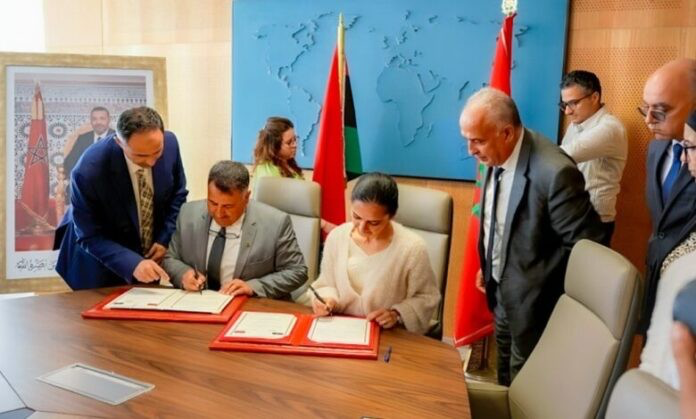Morocco and Libya have taken a significant step towards strengthening their collaboration in vocational training by signing a Memorandum of Understanding (MoU) on Tuesday.
Signed in the Moroccan city of Tamesna, this agreement outlines a comprehensive framework for joint projects, expertise sharing, and overall cooperation in the vital field of vocational skills development.
It was signed by Loubna Tricha, Director-General of Morocco’s Office of Vocational Training and Labor Promotion (OFPPT), as well as Yekhlif Said Sefao Amhimid, the Libyan Minister of Technical and Vocational Education.
Libyan Ambassador Ibrahim Ataweel and Waleed Addas, Director of the Rabat regional office of the Islamic Development Bank (IDB), were also present, reflecting the regional importance of this partnership.
This MoU goes beyond simply increasing the number of Libyan trainees hosted in Morocco. While OFPPT will continue to host around 20 Libyan trainees annually, the agreement opens doors for a wider range of collaborative efforts.
Notably, OFPPT will conduct evaluations of Libya’s vocational training system, paving the way for a joint action plan. This plan will focus on enhancing training design, improving trainer skills, and strengthening technical competencies in key areas for Libya.
Leveraging OFPPT’s established expertise, the MoU also facilitates the training of Libyan trainers in priority sectors. Additionally, administrative, technical, pedagogical, and managerial staff of Libyan training institutions will benefit from OFPPT’s knowledge base.
The partnership extends beyond training programs. Technical support for establishing vocational training centers tailored to Libya’s specific needs is a key component.
Looking beyond national borders, the MoU also aims to develop joint training programs in mutually beneficial sectors, in effort to foster a culture of exchange and innovation.
Furthermore, it encourages twinning programs between similar vocational training institutions, promoting peer-to-peer learning and best practice sharing.
Both Tricha and Amhimid expressed to MAP optimism about the MoU’s potential. Tricha highlighted the agreement’s ability to broaden the scope of cooperation beyond trainee placements, while Amhimid emphasized the value of Moroccan expertise.
